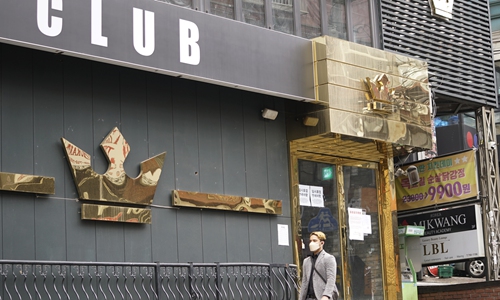S.Korea deploys mobile data; police tackle new cluster case
Source:AFP Published: 2020/5/12 18:08:40

Seoul, capital of South Korea, has closed more than 50 bars and clubs linked to a cluster of COVID-19 infections. The city government Saturday ordered clubs and bars shut to prevent a potential second wave of infections. Photo: cnsphoto
South Korean authorities said Tuesday that they were using mobile phone data to trace Seoul nightclub visitors as they try to tackle a coronavirus cluster, promising anonymity to those being tested due to the stigma surrounding homosexuality.
The country has been held up as a global model in how to curb the virus, but a spike of new cases, driven by the cluster in venues in Seoul's Itaewon district - including several gay clubs - forced authorities to delay this week's planned re-opening of schools.
Many nightclub customers are believed to be reluctant to come forward because of the stigma surrounding homosexuality in the socially conservative country.
Seoul, as well as its neighboring Gyeonggi province and the nearby city of Incheon, and the southern city of Daegu, have ordered the closure of all clubs and bars.
South Korea's reaction to the initial coronavirus outbreak was widely praised, and its handling of this latest spike will be closely watched as parts of Europe begin a cautious re-opening.
Health experts are warning that moving too quickly will result in a surge in infection numbers of the virus.
Officials in the East Asian nation of 52 million reported 27 new cases Monday, taking its total to 10,936, after recording only single-digit increases for eight of the preceding 13 days - many of them overseas arrivals.
As of Tuesday morning, 101 cases had been linked to the Itaewon cluster, Seoul mayor Park Won-soon told reporters.
The city secured a list of 10,905 people who visited the district through data provided by mobile operators and has sent text messages asking them to get tested, he added.
The Korea Disaster Management Headquarters said nearly 2,000 people who are believed to have visited the clubs are currently unreachable, and thousands of police will be deployed to track them down.
More than 7,000 people who have visited the area over the past two weeks have been tested, said Mayor Park - who on Monday announced a 2 million won ($1,630) fine for those who avoid testing.
Homosexuality is not illegal in South Korea, but rights groups say discrimination remains rampant.
AFP
Posted in: ASIA-PACIFIC,EYE ON WORLD